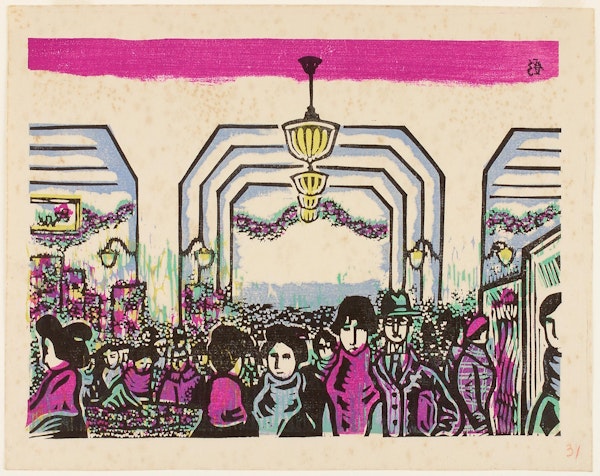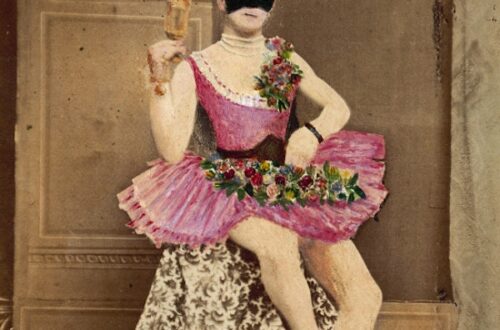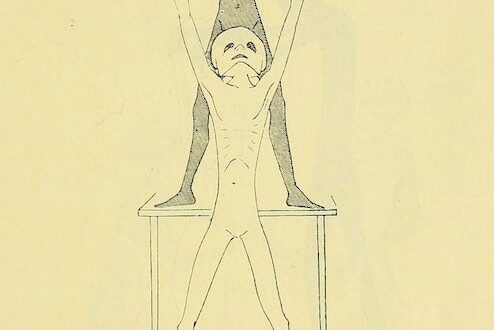
The Experience Thieves
by Thomas Benz
Kawakami Sumio, Ginza, 1929
The Larkins were not splashy people. You wouldn’t find their photograph in a slick magazine featuring charity balls, nor would their obituaries be filled with public triumphs. Yet they were in that unfortunate category of people who were average with above average yearnings. It wasn’t so much that they envied the rich, or anyone else with the privileges of exclusive membership, as they were curious, wanting every now and then a taste of the extraordinary, a peek through a gap in the carnival tent, a glimpse of what wonders lay on the other side.
Their social circles were not scarce, and with a stable of friends gathering for monthly rounds of parties that rotated from one home and liquor cabinet to the next, one would not have guessed the Larkins felt deprived. But Ash especially wanted access to the substance of a charming anecdote, or the whispers of an enclave, or the vista from a balcony to which he had been barred for countless reasons. Early in their marriage, Harper was complicit in her husband’s schemes to satisfy these desires. She must have enjoyed the inchoate thrill of the interloper, that sense of being invisible and immune to getting caught.
Ash was a little odd, someone who was continually defying probabilities, throwing you a slider when you were expecting a four-seam fastball. He was lean and loose-jointed, as if all the moving parts of his limbs were not solidly connected, and under pressure this lent him a deceptive look of repose. Time and again he turned into the long, U-shaped drive of an unfamiliar North Shore mansion, or some other entrance of the privileged, only to be driven off when someone appeared in the window or sounded an alarm. For other more public encroachments, there were ruses about knowing someone inside and needing to deliver an urgent message, attempted small bribes, minor diversions.
In the same way that some were impelled to visit many countries, to have their passport stamped at every port of entry on the planet, Ash felt the need to breach the barriers of wherever he was banned. It did not spring from some Walter Mitty-like urge to feign importance. In his heart, Ash must have been a communist where there was no such thing as private property, where every estate and clubhouse and precinct was open to all. He speculated, only half in jest, about one day obtaining a “key to the city,” a pass to every sight and sound of interest. His typical rallying cries were “I just want to see what it’s like” or “Who do they think they are?” or “It never hurts to look.” Harper, an avid reader, would occasionally mention that in the case of Lot’s wife at Sodom, Phineus’s encounter with Medusa, or anyone’s gaze at the basilisk of Cyrene, a look could in fact hurt quite a bit, but Ash could not be moved.
The apex of Ash’s stealthy entrances occurred when he was forty-three, the year after he suffered a financial reversal when the marketing company he worked for started to retrench. So much of the business was shifting to television, a different niche, but Harper refused to leave the area where he might chase more opportunity. And Ash had bought a bond issue in a coal project that had gone belly up. This was in the sixties when a fair number of people seemed to be getting ahead while he was stuck, imperceptibly slipping to a lower tier. He was disturbed he was not a member of one of the local country clubs, especially Broadmore, only a few miles away and renowned for its championship course which had once hosted the Heartland Open won by Julius Boros, that languid, chain-smoking figure with the elastic swing, the sort of player who never seemed to sweat.
Broadmore was a paradise carved through a forest, the expanse of manicured grass a kind of Eden. Ash’s grandfather, an astute stock broker, had belonged, and Ash himself had been a caddy there for two summers, a place where a few minor celebrities would appear when they were performing at a nightspot downtown called Drury Row. Though Ash’s golf game was middling at best, he had to settle for a driving range at the edge of town called the “Murph’s Stop and Sock” with its bullseye circles like archery targets, floodlights boring through the darkness along Halstead Avenue, its circumference of netting, and balls on tees that rose from underneath the mats. A neon sign above its long horizontal roof created the streaked mirage of a ball zooming into the sky.
What made matters worse was that Ash knew the president of Broadmore, a guy who had also matriculated at Belmont Tech, a very successful lawyer whom Ash had not kept in touch with, only exchanging pleasantries at their once-a-decade school reunions. Harper was once invited to the club for a baby shower. Ash told her to lift something no one would notice, something imprinted with the club’s name and logo. He was in the habit of taking unauthorized “souvenirs” from grand places they had visited in their early days, items too insignificant for prosecution—a napkin, a corkscrew, a pen, a bookmark. Harper found herself appalled by his request, but she knew how much these scraps of the good life meant to him, so she managed a few sheets of the club stationary with its dragon emblazoned at the top.
Once upon a time, buoyed by a small inheritance, Ash had applied and been rejected with some euphemism, the true reason for the blackball never revealed. But back then, their Chevy was fairly new, not the two-toned wreck it would eventually become, and the sentry at the gate never charged from his station to question Ash’s passage. If the kids were with him, (as they returned from a movie or a department store) he instructed them to smile and wave as they passed through.
“It’s true of many things in life,” he said one afternoon with a certain satisfaction as they sought an unobtrusive parking spot. “You just have to act the part. You have to fool people so well that once in a while, if you’re lucky, you even fool yourself.”
They would make their way across the immense oval driveway that fronted the red brick clubhouse, as imposing as a destroyer, except with an array of chimneys and windows and columns. If it were twilight and all the players had finished, they might head to the side terrace. From there he could see the pool and diving board, lounge chairs that ringed the water and reflected shadows wavering along the surface. He might be able to make out the snack bar and the patio where there were dances when some combo played “Chances Are” or “My Funny Valentine.”
If Ash ventured inside, things would get trickier. Someone, a waiter or perhaps a member who had memorized all the other faces, would approach and offer assistance. The intruders, beyond the point of no return, followed the script, did their best to affect a vaguely bored manner as Ash talked. He had three or four standard ploys, all of which would allow him his precious five minutes to survey the scene. One line was that the engine had started smoking and they were miles from the nearest station. He was hoping to be directed to a phone. Another, the most humiliating, was that Mia, who was the youngest, was in vital need of a bathroom. At such moments, her brother Dex would be struck by an unrelenting desire to expose the whole operation.
When suitable, he chose the emergency meeting strategy. “It’s very important I speak to Haggerty for a minute,” he might say evenly. “I know this is unusual but it’s important and I was told he was here.” This would let him wander the lobby, take a peek into the card room, catch a fading panorama of the back nine, its convoluted design and tree etched grass funneling toward manicured shapes mowed around flagsticks, while the waiter searched for some wholly fictional man.
Ash’s grandfather had been a terrific golfer and had given him a few lessons at Broadmore before suddenly passing away. He vividly remembered what lay beyond the anterooms; chandeliers and ceremonial brass spittoons and century old pictures and memorials to the greats who had trod the links. He must have held it in his heart that when his own father disdained his opportunities to play, some great potential had been thwarted. When he returned to the sedan, the kids always noticed he had a wistful look, a kind of gratitude that he had been able to steal a few moments there, fused with a perpetual restlessness about what might have been.
Ash’s father, a pharmacist, had never suffered any serious life setbacks. So that Ash’s own financial misfortune, occurring at the crossroads of middle age, must have accelerated his inclination to ignore boundaries. When the Larkins moved, even the children saw their new ramshackle address as a downgrade. Gone were the majestic oaks and willows which formed a triumphal canopy over their former street. The house was at the farthest point of a dead end street and this seemed symbolic of their general predicament. The neighborhood was characterized by unpaved alleys, a pool hall, a vacant lot overgrown with thistles and weeds like some misbegotten prairie, and a junkyard only a couple blocks away, its rusting hulks scattered like the remains of a battlefield.
Still, Ash was full of the vigor of false optimism and proclaimed to anyone who would listen this was a temporary setback, that the family would be ascendant as soon as conditions improved. Harper wanted to go back to work for her old newspaper, perhaps as a stringer, but with her former bosses no longer there, and with all Ash’s travel selling to far flung radio stations, it didn’t seem feasible. Ash still delighted in hearing a thirty second piece of his on the airwaves or learning that one of his sign ideas had gone up on some backwater state highway. He carried ad lines around in his head the way people had an unconscious current of song lyrics. But to those who ran into him in those days, at church or a school play, he appeared distracted, as if he expected something, something he could not even have named, to suddenly just happen.
There were other infamous expeditions. Usually solo affairs, on a whim, some privileged place he found while traveling to see one of his outlandish signs for motor oil or shampoo or term insurance. When he arrived home, after a scotch, he would tell the kids about his efforts, often with the grievance that he had been intercepted too soon. He being banned, prohibited, shut out only made him more impulsive. Private docks, open houses, fancy hotels. He would go to car dealers and test drive Porches and BMW’s, vehicles he could never afford, under the suspicious eye of the salesman, which he deflected with some newsy banter―merely for the feel of having done so. Once when he happened by Landauer’s Bakery, just closed and thus depriving him of a Bavarian Crème, he went around to the alley where an exhaust fan blew the confectionary ether through a vent and stood smelling it in a sort of rapture, until he finally remarked aloud, “I swear I can taste it, custard and all.”
Harper also had a quirk, a means of escape one might say, which was not so mortifying as Ash’s, yet still peculiar, and stemming from a similar radical curiosity: a need to know how the celebrities lived. Merely reading about them, pouring over biographies or visiting Grauman’s Chinese Theatre, was not enough. The real stars never came to Drury Row, but she dragged Ash there whenever she could and kept tabs on the various luminaries, the royals and Oscar winners in the tabloids. Harper had first gotten hooked when they were in Los Angeles for a cousin’s wedding and had found themselves in the same restaurant as Tom Hanks and Julia Roberts.
Although they were seated a half dozen tables away, Harper repeatedly glanced between the diners and decorated pillars to catch a smile, a remark she could not hear but only imagine. Just the act of eating itself in that company felt exalted. The actors were in a roped off section and there were strict rules about not straying too close. She would have never considered accosting them for an autograph or complimenting one of their movies. Neither she nor Ash took this inaccessibility as an affront, and paradoxically Ash feigned disinterest in the stars, as if to envy them would be gauche and juvenile.
Several years before she married, Harper still had a family connection to The Gazette, which published a knock-off of “Dear Abby” called “What Do I Do?” Despite appearances, there were so few letters from real people that the writer, Carol Spaulding, could use. The questions she received were often unsuitable for one reason or another, too common or salacious or incoherent with rage or heartbreak, so Harper was enlisted to devise more entertaining ones.
Carol would offer her a concocted scenario that might boost circulation—a trapeze girl who runs off with a lion tamer but laments that he’s never picked up a book in his life, or a crime associate who’s had to go into a witness protection but is unable to tell her lover. That kind of thing. Sworn to secrecy, Harper had no scruples about inventing supplicants, manufacturing conundrums. She was good at contriving odd details and plausible though not too extravagant emotions, and no one seemed to doubt that the queries were real. Her only regret was that she had given up the trade when two children arrived in quick succession, and her tenuous foothold in the business was gone.
She must have missed making things up because she began writing fake letters to her friends, birthday cards from famous icons they adored. Harper was not a prankster by nature, nor was Ash, and she kept the whole thing on a fantastic plane so everyone was quickly in on the joke. The missives became highly anticipated among their friends and added a certain zest to their gatherings. The fact that the strange envelopes from exotic locales were known in advance to be frauds did not matter. Their extravagant falsehood was the whole point.
Life was not always fun for these people―bankruptcy, cancer diagnoses, getting sacked for no good reason, not to mention the existential mayhem often described on the front page of the papers—so Harper’s fabrications were a weapon of respite. But the epistolary game met an abrupt end after a letter from Jack Nicholson to Lily Maggert. Lily was not a member of the regular crowd, but she had been Harper’s most reliable friend on the university debate team and had recently moved back to the area. Harper knew that she’d long had a crush on Nicholson from his bad boy performance in “Five Easy Pieces,” so it was a natural choice that the note come from him. But on this occasion, the lark misfired from the outset when her husband Frank, who seldom attended the parties intercepted the mail first. He spotted it immediately among the detritus of utility bills, charity solicitations, and store coupons.
Frank was an avid sportsman, poker player, and automobile enthusiast, but the movies held scant appeal. He had apparently never heard of Jack Nicholson, who had yet to win all the awards that would catapult him to fame. The subject of infidelity was a sore one. Some months before, in an inebriated lapse, Lily had revealed that in college, she had once slept with a friend of Frank’s, before their own courtship, of course. But it didn’t go over well. On top of that, Lily’s work as a telecommunications specialist had been demanding long and late hours. In his psychologically rattled state, her husband was incapable of picturing the risqué correspondence as a gag.
When Lily finally got home, weary from the vise-like traffic along Lexington Avenue, Frank, his face inflamed, temples pulsing, bellowed that this was the last straw. He thrust the paper at her, whereupon she broke out laughing and explained the subterfuge. Though this eventually set him at ease, he felt like a fool. And after considering the matter further, Lily became angry that he had threatened an ultimatum based on such flimsy evidence, causing discord in their home for a fortnight. When Lily conveyed the story, Harper felt this was an omen that the sport had run its course. In a mock ceremony at their next cocktail hour, they burned the evidence of fanciful desire in their living room hearth, as everyone raised their glasses.
One autumn, a favorite billboard for an electric shaver was vandalized, the pictured gentleman stroking his silky smooth chin transformed into a savage pirate. The grooming company was not thrilled with the replacement’s new location at the base of a forlorn bridge and threatened to complain to Ash’s boss. A funk descended on him like a plague of locusts as he contemplated the random wickedness of civilization. Shortly after, Ash led Dex to a storefront Buddhist temple in a largely forgotten section of town. They barged through the beaded threshold where two robed adherents sat in a serene lotus position, facing the corpulent, eponymous statue. Neither moved. But when, after several minutes, the new visitors did not leave, the Dogen slowly rose and welcomed them. The man explained that the idea was to focus exclusively on the sound and details of one’s breathing, and that a certain very erect posture was required.
Ash told Dex to sit in the corner, and with some difficulty, assumed a semblance of the proper pose. Somehow the Dogen could tell if a disciple was genuinely trying, or instead thinking of the latest baseball standings. He would hit those he knew to be straying with a light bundle of thin straw on the shoulder. The blow did not really hurt, but the crack, hardly less than a firecracker, was shocking, a mild electric current to the system. Ash understood this was part of the practice to focus the mind, and he only flinched a little when he was gently struck, the instructor going easy on a new apprentice. But after five minutes of this oblivion, which must have felt like days, just after the woman beside him was lashed with special vehemence, Ash got up, said, “We’re sorry. This isn’t the right heathen worship for us,” gathered Dex, and walked out.
A familiar anecdote was his infiltration of the “Around the World Club” at some airport where he had been marooned for a connecting flight. Ash seldom flew, and always coach, always staring at the impenetrable curtain which sealed off first class. A flash of roominess and comfort would only fleetingly appear whenever a stewardess broke through. The exclusive airport lounge seemed just another extension of that barrier. The doors were guarded behind a checkpoint, but he found a spot where he could obliquely peer into the plush room. A long mahogany bar, its tender in a vest and bow tie, a set of tables draped in white linen, a grand piano, the far wall festooned with watercolors of remote capitals he would never visit.
He watched as a thin man in a suit emerged in a rush, and dropped a stub of some kind at the edge of the concourse. Ash hurried to retrieve it, but by then the man had vanished into the anonymous hall of travelers. Ash noticed that the ticket had a name and a date, and figured it was worth a shot, so he entered with his most authoritative stride and went straight past the woman at the counter, merely displaying the pass and asserting, “A little mix-up with my luggage but I can always slum a little until it gets back from LaGuardia.” For the hour he spent there, he felt like a king.
It was remarkable that in all the years Ash had been an interloper, he had never been shot, and always emerged unscathed. There had been a smattering of threatened fines and warnings, a few rough escorts off the premises but nothing serious. There were times when the family balked at getting out of the car, but they knew he was less likely to get arrested if they accompanied him. Harper eventually underwent an evolution from accomplice to reluctant witness, and finally to vexed wife. She had lost her nerve, run out of forbearance, succumbed to the notion that they were what they were, and lost her appetite for the kind of adventure that might lead to a mortifying exit. Yet she loved Ash despite everything, knew that they had curtailed one another’s dreams, and hoped he could be eased down gently when he finally grasped that they no longer needed to reach for the moon.
On the return home from their last “country drive,” Ash took County 22, the scenic route. Everyone in the rusty Cavalier, veterans of Ash’s insane impetuosity, exchanged worried glances. Twenty minutes later they once again approached the western edge of the Broadmore Country Club.
“We have to be home by seven, Ash,” Harper said. “Can’t we explore some other time?”
“This will be a short one, I promise. Just a few minutes, a taste of how the other half does it.”
As he drove, he implored Harper and the children to cooperate, regaled them with familiar anecdotes about grandfather Syd, about how he gave him a pass for the majestic pool with its forbidding diving board, and later ordered a cheeseburger and “Black Cow,” which was a phenomenal combination of root beer and vanilla ice cream. Coming into sight of the course, far from the entrance, he seemed to fall into a rapture, scarcely able to keep his eyes on the road, Ash summoned back another age saying, “That was where Boros received his trophy,” and “That was where Eddie Fisher sang an impromptu version of ‘Come Fly with Me.” As usual, he bade them to acknowledge the guard with near total indifference.
There was a new recruit in the station at the gate, and perhaps due to his newness on the job, a more vigilant one. He even wore the cap of a French gendarme. When he raised both hands, palms outward, it became apparent a new system would be enforced. Though Ash never showed his distress, Harper must have momentarily seen how shaken he was, as if he too were growing weary of the game.
“I’m sorry. We’re guests. A sort of last minute thing.”
“Very good. Of whom, sir? It’s a formality but everyone has to be on the list now. There have been a few incidents lately. Every time there’s a new show in town, things get a little crazy around here.”
“I understand. Harold Grissom. We went to school together. Though I never could keep up with him. We’re the Larkins.”
“Ah, let me just take a look.” He grabbed his clipboard and began scanning the names. Only an expert eye would have detected the fine lines of panic at the outside edge of Ash’s eyes. Mia and Dex waited for the onset of uneasiness, then expulsion. Yet the veneer of politeness remained. “I can always call inside if there’s a discrepancy,” the guard said. “I know he’s here today.” He began to pick up his walkie-talkie, and they could all hear static when he switched open the line. “Is Mr. Grissom available?”
As Ash slipped into a state of paralysis, Harper remained surprising equable. “Show him the letter, dear.” she said, all but ignoring the uniformed sentry.
“Which one is that, love?” Ash inquired, surprisingly absent his usual feigned authenticity.
“You know, the one he sent us a few months ago.” Harper waited a beat while Ash sweated his improvisation. He looked like a condemned man, as if certain the whole ploy would spectacularly backfire. “Oh, I forgot. I have it,” she almost shouted. “Harold said to show this if we ever had any trouble. You know how I stuff everything in here for a rainy day.” She reached into her mauve purse which was neither tiny nor huge, worn or particularly elegant, and after some rummaging around, extracted a piece of paper from a small pouch.
“Yes, of course, the letter,” Ash said, with an astonishment that was for once authentic. And strangely, he saw Harper as he hadn’t seen her for years. Remembered why he loved her.
Harper didn’t know what had prompted her to do it, perhaps a nostalgia for her celebrity notes, but one night she’d found a piece of the stationary she’d lifted at the bridal shower and, knowing how much her husband felt banished from Broadmore, began composing the letter which made reference to the close friendship he and Grissom never had, even throwing in a nonexistent trip to Atlantic City for good measure. The letter ended with, “Please stop by anytime so you can enjoy our wonderful dining room and I’ll be happy to show you around. We can reminisce about the good old days. Warm regards, Harold.”
She handed the paper to the guard in a peremptory way with the intended result that he would have to put down the receiver, and read the forgery. Gradually the tension in the guard’s features relaxed and then there was another crackle on the line and a distorted voice said, “He can’t come right now. What is it?”
“Never mind,” the security man said, and seeing a Cadillac now behind Ash, he made an impatient gesture. “Go ahead.”
They continued down the maple-lined drive, past the small pond that bordered the immaculately white neoclassical clubhouse. Harper said, “You owe me one.”
Ash attempted to drink in the private view of the riding stables, which no longer boarded horses, but rather electric golf carts. He attempted to recapture the possibilities of his youth, staring out at the limitless green expanse. And yet for once, he found it difficult to envision his grandfather striding up the slope toward the final green, even harder to see himself waiting in the caddy area, playing pinochle.
“You pulled a rabbit out of a hat back there,” he said. He wanted to thank her with genuine feeling but in the moment didn’t quite know how. “You’re better at stealing experience than I’ll ever be.”
Then he recalled Grissom, who might be cloistered in some upstairs inner sanctum, but who also might have come into the common areas for one reason or another. Ash knew the pain of exposure would be acute, especially with an old classmate who knew him before so many doors had been shut. And for the first time in his life he felt unsure, perhaps a stab of fear, perhaps simple resignation.
They parked in a place where they could see the grand wooden gazebo, a slice of the low building which afforded a place to change for the beach, the sun umbrellas, each marked by the same foreign heraldic logo. Gazing across the landscape, soft in the slanted light, he seemed to see that the past would no longer hold there, that the power of his artifice was not enough to summon it back.
They were about to get out, but Ash abruptly stopped, stared at his steadfast wife, his loyal kids, and said, “You know, I don’t think we have time after all.”
Harper looked confused. “Are you sure? After all that?”
“It’s beautiful,” Ash blurted out, not knowing what he was saying anymore, “But better from a distance. Better imagined.”
The car went quiet for a minute, stunned by the lack of fireworks, the dreaminess of his retreat. And then Harper said with a lilt of affection, “Let’s go home.” Ash never went back to Broadmore or any other place he was not welcomed as himself. Though there were times when he and Harper might be walking the family’s beagle in the park, or sitting at a crowded restaurant, or on a train platform or street corner or any place where people mingle within earshot. He would overhear some elliptical fragment of a life, about an affair or family scandal or imbroglio over money, and then the music would be turned up or the couple, leaning close to each other, might decide to wander off. So that he was left with that piece, that shard of intrigue, the rest being casually torn away like a kite in the wind. He would get that strange look and start to follow them, and Harper knew that it took him every ounce of restraint not to plead, implore, offer the strangers a reason to let him in on their confidential exchange. Once he even said it out loud—”for the love of God, tell me the rest.”

Thomas Benz holds a Bachelor’s degree in English from the University of Notre Dame and is the recipient of the 2017 Serena McDonald Kennedy Award for his short story collection, subsequently published as Home and Castle (Snake Nation Press). His stories have been published in The Madison Review, Catamaran, William and Mary Review, Cold Lake Anthology, Mud Season Review, and others. His short fiction has won contests at Solstice Literary Magazine and Song of the-Broad-Axe Publications. He was awarded third place in Hypertext Review’s short fiction contest. He was a finalist for the Flannery O’Connor Award for Short Fiction and the New Millenium Writings short fiction contest. His website is https://indielit.net. His Facebook page is www.facebook.com/ThomasBenzWriter.




